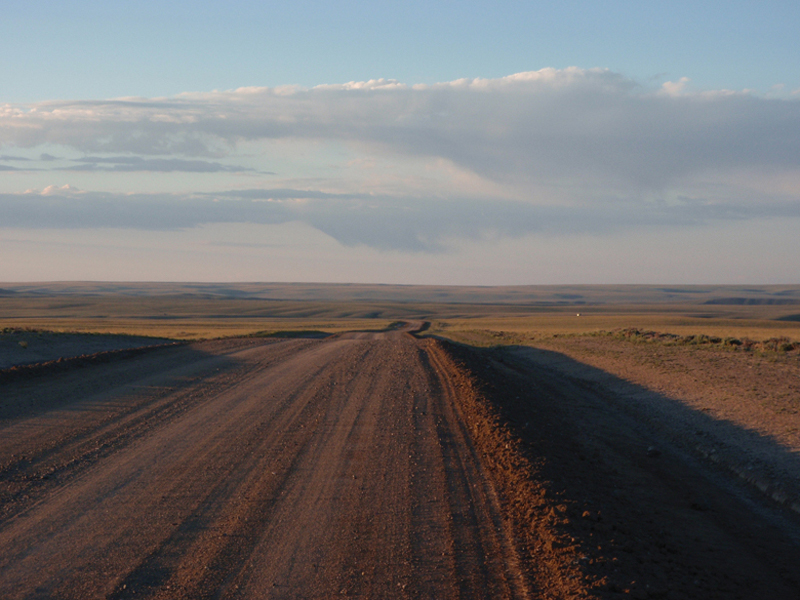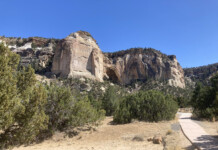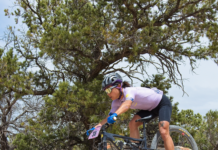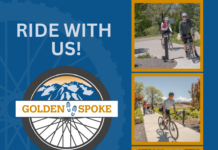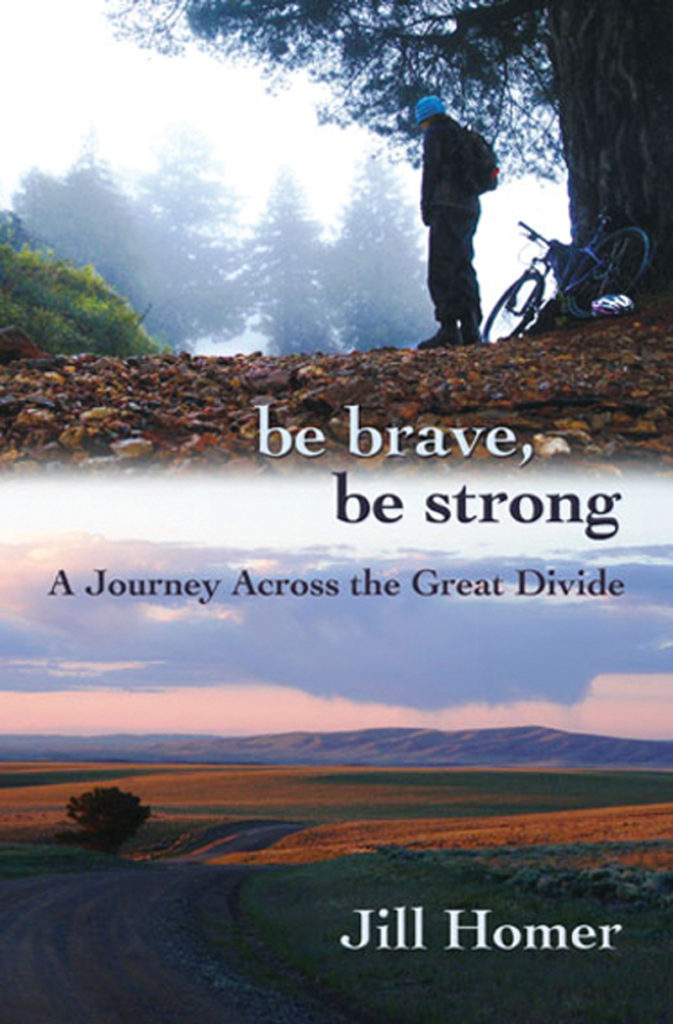
2,740 miles from Canada to Mexico along the Continental Divide. But in the tradition of best-laid plans, Jill’s dream starts to unravel the minute she sets it in motion. An accident on the Iditarod Trail results in serious frostbite. She struggles with painful recovery and growing uncertainties. Then, just two days before their departure, her boyfriend ends their eight-year relationship, dismantling everything Jill thought she knew about life, love and her own identity.
“Be Brave, Be Strong: A Journey Across the Great Divide” is an adventure driven relentlessly forward as foundations crumble. During her recordbreaking ride in the 2009 Tour Divide, Jill battles a torrent of anger, self-doubt, fatigue, loneliness, pain, grief, bicycle failures, crashes and violent storms. Each night, she collapses under the crushing effort of this savage
new way of life. And every morning, she picks up the pieces and strikes out to find what lies on the other side of the Divide: Astonishing beauty, unconditional kindness, and boundless strength.
The following is an excerpt from the book. Signed copies are available for sale at arcticglasspress.net.
By Jill Homer
A layer of frost coated my bicycle as I packed up my stale pastries and Spam and pedaled out of Atlantic City. A chill hung in the pre-dawn air, which was thick with frozen vapor. My right knee was still slightly swollen and stiff, and protested loudly after just a few strokes up the hill out of town.
“Lucky for you, the Basin’s pretty flat,” I said as I hopped off the saddle and started pushing. The gravel road cut steeply up the bluff, gaining 500 feet in just over a mile. Cold oxygen burned my lungs as I labored around the switchbacks, trying not to think about my knee or the remote miles that lay in front of me.
As I rounded the last switchback onto a plateau, my shoulders relaxed and my jaw dropped. The Great Divide Basin yawned over an unbroken horizon, as vast and open as an ocean. Rolling drainages rippled like waves, clusters of sagebrush appeared as islands, and tall grass shimmered like seawater as it swayed in the breeze. The warm light of sunrise saturated the surface in iridescent colors. Greens took on a florescent glow, browns became bronze, yellow turned to gold. I pulled out my camera to take a few photos, but understood the images would always be a disappointment. Such is the price of great beauty, because while eyes can see and cameras can mimic, only experience and presence can reflect the sublime.
Of all of the regions along the Great Divide Mountain Bike Route, the Great Divide Basin has perhaps the most notorious reputation, at least among racers. Veterans speak of it in dismissive tones and warnings: “There’s no trees, there’s no water, there’s no people, and there’s nowhere to get food. There’s only wind and heat.” It was hard for me to believe that a lack of crowds could be a bad thing on a cold, calm morning, with a pack full of food and water, and the absence of trees to open up a spectacular view. It’s on these open plains where the true shape of the world becomes apparent, with its scoured surface and arching horizon. For all of its jagged contours and conventions, from a distance the globe is just that — plain and round.
I felt deeply drawn to the Basin for personal reasons as well. My family on my Dad’s side comes from a long line of Mormon pioneers, hearty stock who immigrated to Utah in the 1850s after traveling through this region with a human-powered handcart company. The Great Divide Mountain Bike Route closely parallels the old Mormon Pioneer Trail, crossing historic sites where my ancestors and their families and friends toiled, struggled and sometimes perished in a harsh, high desert that hasn’t changed all that much in 150 years.
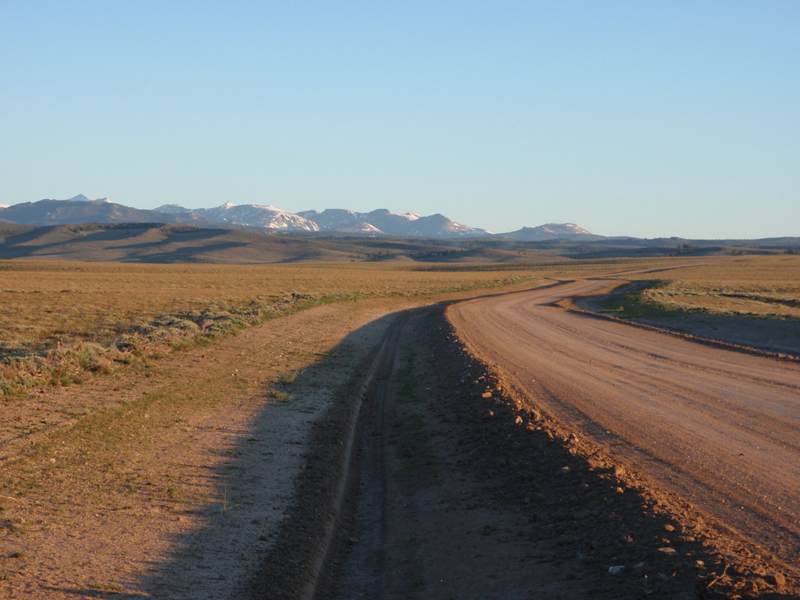
Of course I had modern gravel roads to follow, the modern wonder that is a bicycle to propel me forward, and modern knowledge and technology to help guide me. But on some levels, my struggle was not entirely different from the struggles of my pioneer ancestors. Like many of them, I carried my whole life on a contraption that I had to move with my own power. I had to cope with similar isolation and uncertainty. I had to battle a primal sort of pain and fatigue that even 150 years of progress hasn’t stripped away. As I gazed out across the prairie, I liked to believe that I was seeing the same things that my great-great-and-so-forth grandparents saw, that I was feeling the same things they felt. Their blood pumped through my veins, their sacrifices inspired me, and their faith drove me forward.
As I pedaled into the rising daylight, a small group of antelope grazing next to the road became startled and sprinted beside me, loping through the brush with enviable grace. I passed the cutoff marker for Willie’s Handcart. Marjane had told me this was the site of a Mormon tragedy, where sixty-seven pioneers became trapped in a severe October snowstorm and died. I asked Marjane why they were traveling through Wyoming so late in the year. She told me the pioneers had difficulty with their handcarts. They had built their wheels in the humid east, and when they reached the west, the wooden hubs cracked and broke. The collapsed wheels and required repairs slowed the pioneers considerably until winter caught up to them. It was a quiet reminder of that precipice everybody straddles; that sometimes all it takes is one thing going wrong for entire lives to spiral out of control.
The first thirty miles of the day passed in dreams about the distant past, until the present was all but lost to me. Grass shimmered in the sun and breeze, antelope darted beside me, and my imagination didn’t have to stretch too far before it was 1854 again. I was still floating through the time machine in my mind when I started up a hill and my crank suddenly stopped working. The bike slowed to a stop. I spun the pedals frantically but the back wheel stayed planted in place until I nearly tipped over. I jumped off the bike. “What the hell?” I said out loud.
I lifted the back end off the ground and spun the crank with my hand. Even as I turned it as fast as I could, the rings did nothing to engage the wheel into motion. I checked to see if the chain was broken somewhere, but it was still intact and the rear cassette still turned with the cranks. I thought with sinking dread that the problem must be my freehub — one bicycle part I definitely did not have the capacity to fix.
A freehub is an internal part of the wheel hub that allows a cyclist to coast. When the cyclist spins the crank forward, the pawls inside the freehub engage and catch the hub, turning the wheel. Then, when a cyclist stops pedaling, the pawls release, which allows the wheel to spin free even if the crank and pedals are not moving. It seemed my freehub was stuck open, which caused the pawls to disengage even when the pedals were being turned. My bike was locked in “coast” mode, a mode that only works if you have gravity working for you. Without a working hub, my bicycle was as useless as a laundry cart.
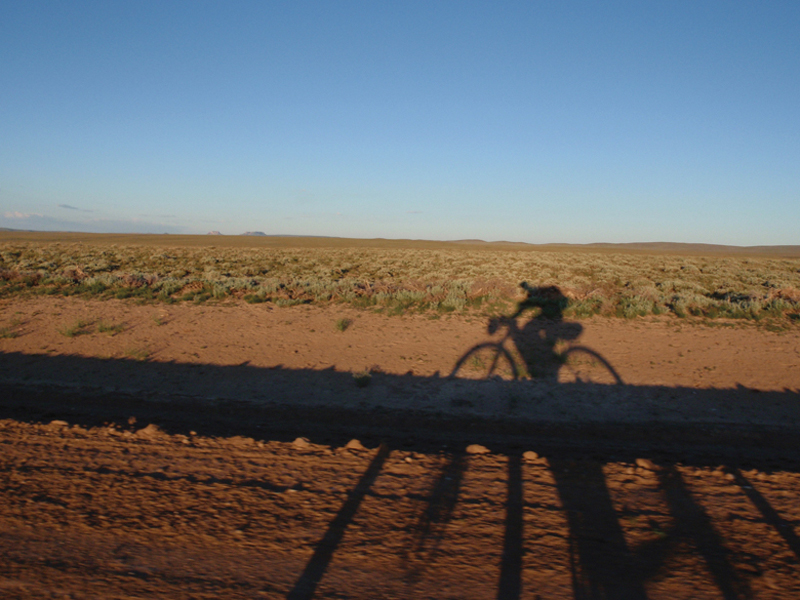 “Crap! Crap! Crap!” I called out to the still air. I threw my bicycle onto the road and paced around. What were my options? It was a thirty-mile walk back to Atlantic City. Doable in a day, but what exactly could I do when I got there? I needed a new hub — and probably an entirely new wheel. As lucky as I had been in Atlantic City, expecting that town to contain an available 29-inch rear mountain bike wheel was pushing that luck more than a little. There was no way I could walk forward on the route. It was 110 miles to Rawlins with no towns or even houses along the way. I didn’t have enough food or water to make such a trek on foot, and hitching a ride forward on the route was a race-ending infraction, although I didn’t expect the temptation to arise because I doubted that much vehicular traffic ever ventured out this way.
“Crap! Crap! Crap!” I called out to the still air. I threw my bicycle onto the road and paced around. What were my options? It was a thirty-mile walk back to Atlantic City. Doable in a day, but what exactly could I do when I got there? I needed a new hub — and probably an entirely new wheel. As lucky as I had been in Atlantic City, expecting that town to contain an available 29-inch rear mountain bike wheel was pushing that luck more than a little. There was no way I could walk forward on the route. It was 110 miles to Rawlins with no towns or even houses along the way. I didn’t have enough food or water to make such a trek on foot, and hitching a ride forward on the route was a race-ending infraction, although I didn’t expect the temptation to arise because I doubted that much vehicular traffic ever ventured out this way.
I remembered from my Iditarod days a trick racers used when their freehubs froze in the extreme cold. They would zip-tie their cassettes to the spokes of the wheel, converting their drivetrain to a fixed gear and bypassing the need for a hub. But I had only heard about this repair in theory. I had never seen it in practice. I carried a few emergency zip-ties, but I only had about five of them. The expectation that five thin strips of plastic could handle all of the thrust and force of 110 miles of gravel-road pedaling seemed dubious at best. If I didn’t break the zip ties, I’d break the spokes, I felt certain. And if I broke the spokes, then my wheel would collapse, and I’d really be screwed.
The first thing to do was to make sure the freehub really was stuck beyond return. I walked my bike up the hill and began coasting down it, frantically turning the useless pedals like a rabid hamster. To my amazement, I felt a sudden, hard force on the down stroke, and just like that, I was powering the bike on my own again.
I rode a few hundred yards before stopping. I still needed to assess how much I’d be able to depend on my hub. Sure enough, when I got back on the bike, the hub was stuck open again. I lifted the rear wheel off the ground and spun the crank frantically with my hands until the hub caught. I jumped onto the bike before it had a chance to cool down and pedaled furiously down the road.
What had become clear is that if I wanted the hub to continue engaging, I had to keep the pedals turning. Even during the few seconds I allowed it to rest while coasting down a hill, the pawls would freeze up and I’d have to spin the pedals furiously to release them again. The big question remained in how wise it would be to continue forward on the route, farther into the oblivion of the Great Divide Basin. I could spin the crank to coax the pawls back to life now, but what would I do if and when that technique stopped working? The farther I pedaled from Atlantic City, the farther I was going to have to walk through dusty, open desert should the need arise. The halfway point of the Basin was far away to even think about.
But going back to Atlantic City was a dead end. I couldn’t let myself accept it — turning around and potentially ending my race on something as simple as a stuck freehub. I formulated a plan. I wouldn’t stop pedaling for the rest of the day. At all. Even on the descents, I would spin the crank wildly to keep up with the speed of gravity, but I would not stop pedaling. There would be times I would need to pee and refill my drinking bladder from my water reserves, and also to change out my maps. Those times would have to be reserved for the only two points on the route that had viable exits within walking distance of an off-route town. The first emergency bailout was at mile 47, about seventeen miles away. From there, I could leave the route and walk fifteen miles north to a town called Sweetwater Station. The second and last emergency bailout was at mile 66, where Jeffrey City lay fourteen miles north. After that, I was pretty much committed to Rawlins. A wave of stress crescendoed through my gut but the plan seemed simple enough. Just don’t stop pedaling.
My right knee did not react kindly to the frantic downhill pedaling, but I put the sharp bursts of pain out of my mind. An angry knee was small potatoes compared to a failing bicycle in the Great Divide Basin. To relieve the pain, I stood up in the saddle, which only worked to increase my speed and re-irritate my knee. I arrived at the Sweetwater Station cutoff in what seemed like no time at all. I jumped off the bike, darted into the bushes, ate one of my dust-flavored pastries, refilled my feedbag with Oreo cookies and one of the packets of Spam, and lifted the wheel up to hand-turn the crank. I spun the rear tire for a full thirty seconds, and nothing happened.
“Come on, come on,” I coaxed, spinning the crank as fast as I could physically muster. My biceps burned. I thought of the pioneers of Willie’s Handcart Company, whose spirits lingered in this desert after broken wheels indirectly led to their deaths. My situation was not nearly as dire as a winter storm in true wilderness, but my heart raced just the same. “Turn, damn it!” I screamed.
I felt a sudden force on the crank and the knobs on the tire lurched forward. I dropped the bike onto the ground and vaulted onto the seat in a single, surprisingly flawless move that didn’t even break the cadence of the crank.
Back on my bike, I moved with single-minded purpose toward mile 66. I passed an active oil drill and a handful of ramshackle sheds, but I had yet to see another vehicle or human being. A seemingly endless herd of antelope grazed and trotted beside me. Their grace and ease mocked my awkward dependence on a failing machine, and reminded me that when humans stand alone, our weaknesses outnumber all of the creatures of the wild.
My leg muscles began to burn constantly and my back felt weak and sore. It was day twelve of the Tour Divide, and my body was starting to wear. The long days of pedaling demanded frequent breaks to cool my overheating muscles and rest my overworked joints, like a rattling old Buick that had to be coaxed along an extended road trip. Without the opportunity for breaks, the fatigue and soreness grew exponentially, until I squirmed and shifted on my bike like a person who can’t find comfortable position in bed.
At mile 56, I slurped the last of the water in my drinking bladder. “Crap!” I said. “I knew I should have refilled my bladder at mile 47!” By late morning the heat had built considerably, until I was sure that despite the below-freezing morning, the afternoon temperature was climbing above eighty degrees. But I had to stick to the plan. Every mile I couldn’t keep pedaling was a mile I might have to walk, so I had no choice but to keep pedaling.
At mile 62, my throat was dry and my drinking bladder still empty, but my own bladder was completely full. The organ bulged and pressed against my abdomen until I was certain I could feel urine leaking out of my eyes. If it was only a need to pee I might have strongly considered just letting it go — after all, I was already drenched in sweat and wetting my shorts in that manner wouldn’t be that much different. But there were other ways I needed to relieve myself, too, ways that I didn’t want to end up in my shorts. And that demand had reached a fever pitch of desperation that no amount of fortitude could mute.
“It’s only four more miles, just four more miles, be strong, be strong,” I chanted to myself. But another, seemingly louder inner voice was screaming, “You can walk four more miles. Just stop! Stop!”
At mile 64, the loud voice won out. The road traveled down a long, gradual slope, and I could even see the junction where I might have to turn, but I could not wait two more miles. I tossed the bike down and darted to a sagebrush bush five feet away. It wasn’t very far off the road, but I there seemed little need for privacy. It was in that sensitive position that I saw my first vehicle of the day. The truck rumbled down the Jeffery City road, turned right at the intersection, and drove directly toward me. I ducked lower but I knew that for the most part, I was in full view. I finished my business, pulled my shorts up while still in the squatting position, and slithered away from the brush. I smiled and waved at the driver as he passed and waved back. I was certain he knew exactly what I had been doing, but strangely, I felt no sense of embarrassment. I was too deeply immersed in stress and struggle to care in the least about social propriety and image.
I removed my spare water holder from my backpack and refilled my drinking bladder with lukewarm liquid. After taking a few long gulps, I commenced the hand-turn effort to try to engage the freehub. I spun the crank for a while, more than a minute, with no movement. I stood up, paced around, and then knelt down to try again. Another minute passed. I spun until my biceps burned, but nothing.
“Please,” I pleaded. “I need you. Can’t you see I need you?”
I decided to try my legs, which had the advantage of more power but also had less balance. I set the bike down and hopped on the saddle, spinning wildly. The bike started to teeter. I put my foot down, then placed it back on the pedal and tried again.
Almost like magic, the bike suddenly lunged forward. “Yeah!” I yelped. “Yeah!” I started pedaling harder, nearly sprinting the rest of the way to the Jeffery City cutoff, where I made a triumphant right turn. I guzzled more water and relished in my renewed comfort. But I couldn’t let that complacency last long. I furrowed my brow in deep determination.
“It’s Rawlins or bust,” I said.
By mile 75, my leg muscles were on fire again, needling my senses like whining children in the back seat of a car. “Are we there yet? Are we there yet? Are we there yet?” I stood and leaned over the handlebars, trying to push out some of the acid that was churning through my veins. As I pedaled in that awkward position, I realized that whatever mutiny was going on in my muscles had blocked out all of the nagging stiffness in my right knee. In fact, the angry knee felt downright chipper as I pedaled unceasingly, traveling in a straight line due south with a hard wind gusting at my side. That feeling didn’t seem to transfer to anywhere else in my body.
“We almost didn’t get the bike started last time,” I finally snapped at my legs. “No way are we stopping now. We’ll stop when we hit the pavement. It’s not all that terribly far. Like thirty more miles.”
I fished my last pastry out of my frame bag and opened the wrapper. I had been saving this one for last; because it was cream cheese flavored, I decided it would be a special treat. I still had my four packets of Spam, which would have to be consumed next, but I was putting off using that calorie source for as long as I could. I bit into another mouthful of disappointment. The cream cheese pastry carried the same taste as its fake-fruit-flavored predecessors — like it had been sitting on a bar shelf for far too long, and had been reduced to syrupy dust. The only difference in this one was a big ball of pasty cheese-flavored substance in the center.
The Great Divide Basin continued, unbroken, uninhabited, unchanging. In the western Basin, drainages rippled through the land. But in the east, a stark flatness emerged. I watched the road stretch ten miles in front of me. An infinity of prairie was only vaguely interrupted by the inevitable curvature of the Earth. But as I rode, tiny contours of hills grabbed my sore legs and then released them. With my battered muscles and ceaseless pedaling, I felt the unrelenting force of every single understated hill — the agony of climbing, the relief of gravity. Even the flat world isn’t flat — a reality only cyclists truly understand.
I managed to reach the rough pavement of an all-but-unused Highway 63. The route turned east and the wind shifted comfortably at my back. But the anxiety of the day had worn on me. That same elevated stress level that likely filled my muscles with acid also filled my head with malaise. Before the Basin, I hadn’t even noticed any saddle sores on my behind, but by that afternoon I was fully cognizant of every ache and pain. After I stood to relieve the agony in my legs, I had to sit back down on saddle sores that brought tears to my eyes. Even my skin burned in the hot sun, but I couldn’t think about stopping to put on sunscreen. It was the ultimate prison of both body and mind — trapped on a bicycle I couldn’t bear and couldn’t trust, but couldn’t abandon.
Even though I carried the burden of nine liters of water on my back, I had been extra conservative with fluid that day, mostly to eliminate that pesky peeing problem. But eight hours of exposure to direct sun and wind had pushed me into a deep dehydration, and suddenly I couldn’t drink enough water to relieve a throat so parched that I constantly felt like I was on the verge of gagging. The mechanicals in my bicycle and the injuries on my body felt deeply connected, as though the two weren’t even fully separated from each other. I laughed at the idea of becoming “one” with my bicycle, but after twelve days on the Divide, I felt as useless without my bicycle as it would be without me. And as long as my bicycle remained battered and broken, my body wasn’t likely to recover.
Just before 5 p.m., with a subdued sort of exaltation, I dropped off the expansive plateau of the Basin and into the gray and sprawling interstate town of Rawlins. Having left Atlantic City after 5 a.m., I had managed to travel the entire 140-mile span of the Basin in less than twelve hours, by far my highest average speed of the entire Divide. For the first time since late morning, I let my anxiety shrink away as I drank in the shot of accomplishment. My athletic feat may have been born of the necessity of not stopping, but it was a feat just the same.
But my victory wasn’t just athletic. I had won the race against typical business hours, and there was a good chance that if I could find the bicycle shop in Rawlins, they might be able to help me that night. A mostly deserted Main Street led to a maze of fast food restaurants and strip malls, and despite spending an entire day in the lonely desert, I felt anxious to leave that interstate pit stop of a town. I needed to buy food and a new wheel, and along with the new brakes and other repairs I hoped to have completed, I would likely have to spend the night in Rawlins. But if I could convince the bicycle mechanic in town to repair my wheel that night, I might be able to get an early start, which was my only shot of making it to my next planned destination, Steamboat Springs, 130 miles south, by the following night.
As I rode down a wide frontage road paralleling I-80, I saw Jeremy riding in the opposite direction. I crossed six lanes of traffic to intercept him.
“Hey Jeremy!” I called out. “Awesome to see you! How are you feeling?”
“Better now that I bought this,” he said, pointing to the massive bundle on the front of his bike. He still had his usual plastic bags of groceries and his sleeping bag, but he had also added a closed-cell foam mattress. “I started the trip without a pad, but I finally decided to get one and they had one at Wal-mart.”
“Wait, you’ve been camping all these nights without a sleeping pad?” I asked. I just shook my head in disbelief. Between the nine-speed bike and the lonely nights on hard ground, I was beginning to think Jeremy was a masochist. “Hey, do you want to split a room tonight?” I continued. “I have to hurry and find the bike shop before it closes, but I can meet you back around this spot and we can pick a motel. Maybe we can grab dinner.”
“No,” he said. “I have my sleeping pad and dinner. I think I’m going to try to get in twenty or thirty more miles tonight.”
“Okay,” I said, disappointed as Jeremy rode away. It would be the last I’d ever see of him. He would stay in front of me for the rest of his race, and eventually drop out in Kremmling, Colorado, with the simple and vague explanation that he would no longer “be Tour Dividing.” He was the only competitor to quit the race without providing a long excuse. I would never learn the true nature of his methods or his motives.
I finally found the bike shop at 5:25 p.m. A sign on the door said it closed at 5:30. “I know you’re closing soon,” I said as I walked in the door. “But I’m in a real bind. Do you happen to have any spare 29-inch wheels here?”
“Twenty-nine-inch wheels?” the white-haired woman behind the counter repeated with a hint of confusion.
“You know, mountain bike wheels. I need a new one with a nine-speed cassette. Or even if you have a fully built bike I could buy one off of, that would work too. I’m willing to pay what it costs. Please, I’m desperate.”
She pointed to a row of mountain bikes lined next to the window. They all looked like they had been lifted from the Wal-mart inventory lot, and they were all the wrong size, with 26-inch wheels. “That’s all we have here,” she said.
“OK,” I breathed in. “How about hubs? A Shimano XT rear hub? Do you have a mechanic who could rebuild a wheel for me?”
“My mechanic’s gone home for the night,” she said. “But he’ll be in at 10:30 or maybe 11 tomorrow. He doesn’t like to get up early. He might be able to help you. I can’t really say. We don’t have a lot of parts around here, but I bet he’ll be able to rig up something. He’s great. Only eighteen years old, but he’s a mechanical genius.”
“Ten thirty,” I said. “Is there any way he’d come in earlier? I’m traveling through with the Tour Divide race, maybe you’ve seen the others in here recently?”
She shook her head. “No, can’t say I have.”
“Um, anyway, I was really hoping to get out of Rawlins earlier than that.”
“I get here at 8:30,” she said. “I’ll call him in the morning, but I can’t promise anything. He’s a teenager. He sleeps in. Now, is there anything else I can do to help you?”
I smiled weakly. She really couldn’t have been less helpful. I half wished the bike shop had been closed when I arrived in town, because that would have at least allowed me to sleep through the night with a glimmer of hope. If the bike shop didn’t have a wheel and likely didn’t even have a hub, there wasn’t much even a boy genius mechanic could do to help me.
I checked into a hotel room, sat on the neat bed in a too-large room, and stewed in low-boiling frustration. I couldn’t decide what to do. I had been having an easier time getting the hub to catch since my initial trouble, but it still gave me difficulty every time. Continuing 130 mountainous miles into Steamboat Springs with a broken hub seemed to be a bad idea, like heading into a long road trip with a slipping clutch. I didn’t know when the whole thing would seize up completely, but it seemed likely to happen at a rather inconvenient time.
And there were other problems, too. Both of my brakes had started squealing horribly, meaning I was basically scraping metal on metal with both pads. I had one set of spare pads, but I had already tried to wedge them in my front brakes back in Atlantic City and couldn’t get the new ones to catch, so I reinstalled the old ones. I suspected there was something wrong with my front brake caliper, and I didn’t want to risk stuffing a new set in knowing they might fall out. Besides, I hadn’t been too worried about the lack of good brakes on the mostly flat Great Divide Basin. But once I hit the mountains of Colorado, I would need top-level stopping power.
Beyond these problems, my cables and housings were gummed up with mud and I could no longer shift the chain onto the little ring. I had already tried to lube both derailleurs and the cables to no avail, and suspected they would need to be deeply cleaned or replaced. The prospect of no low gear in the big mountains also was daunting.
I needed outside advice. The rational choice seemed to be phoning John. He would know exactly what I needed to do. If I had right tools, I thought with a smile, he’d probably be the type of person who could talk me through an entire wheel rebuild. But for some reason, I wasn’t quite ready to call him. There was still awkwardness there, a lot of things John and I left unsaid. And then, almost in the same stream of thought that prevented me from dialing John’s number, I decided to call Geoff.
“Jill?” Geoff’s voice came over the receiver. We had not spoken in several weeks. “What’s up?”
“Hey Geoff,” I said. “I started the Tour Divide. I’m in Rawlins, Wyoming.”
“I know,” he said. “I’ve been watching you. You’re doing awesome.”
“Well, actually, I’m not doing so awesome right now,” I said, and explained my predicament. “What do you think?” I finally asked. “Should I wait here on the unlikely chance that this mechanic can help me, or should I pack up and leave early tomorrow?”
He didn’t even hesitate. “I’d leave,” he said. “Try to get to Steamboat. They have a great bike shop there.”
“But what if I get stuck?” I asked. “And what about my brakes? I didn’t have much luck changing the pads in Atlantic City. I don’t know if it’s me or the brake caliper. Either way, it’s not good.”
“Just change them out and go to Steamboat to get replacements. You’ll be fine,” Geoff said as though he was certain of it.
“Okay,” I said. “I’m going to think about it.”
He paused. “So, how have you been?”
“I’ve been good,” I said. “You know, tired and sore and all that. Well, of course you know how the Divide feels. But I’m having an incredible time. This has been an amazing experience so far.”
“I see you’ve been traveling a lot with John Nobile,” Geoff said.
“Yeah, we spent the whole first week together,” I said. “It was great. After he injured himself he just wanted to take it easy and tour with someone, and I learned a ton from him.”
“But he dropped out?”
“Yeah, in Jackson. I’m alone now, trying to make it work. But suddenly a lot of things are going wrong.”
“You’re doing great,” Geoff said. “You’re going to finish this thing, not wimp out like I did.”
We chatted for a few more minutes. He told me he was back in Juneau after visiting Misty in Sitka for a week. He told me she was going to stay in Sitka, but he returned to Juneau. He didn’t tell me why. He told me he was back at work, and running again, and had some ideas for races in the early fall. But until then, he said, he was just going to run as many mountains as he could find and enjoy summer in Alaska.
“That’s great,” I said.
“I should probably get going,” Geoff said. “But remember that you’re halfway done now. You made it through Montana. The hard part’s over.”
“I sincerely doubt that,” I said. “But thanks for your advice. I’ll do my best.”
I hung up the phone in a wave of emotion — pride, hurt and anger mixed with a hint of nausea. Why did I think it would be so easy to speak to him again? Especially amid the emotional rollercoaster that was the Tour Divide? He was the one person I turned to every time I needed help during the past eight years. But I had forgotten he wasn’t there for me anymore, and he couldn’t help me, and I needed to accept that. Tears welled up in my eyes. I was safely hidden from the world inside a hotel room in Rawlins, but I wasn’t ready to cry about my potential failure in the race and I certainly wasn’t ready to cry about Geoff. I had to get out of my head, so I called home.
My youngest sister answered the phone.
“Sara!” I said. “I’m calling from Wyoming!” I tried to sound excited, but I heard my voice crack.
We chatted a little about the race, and then I asked how she was doing. She was engaged to be married in August. My entire month in Utah had been dominated by plans for her wedding. I had been fitted for a bridesmaid dress, made arrangements to fly home from Juneau after returning from the Tour Divide, and spent a fair amount of time hanging out with Sara and her fianc, getting to know my future brother-in-law. I had struggled with mixed feelings of happiness and jealousy about the idea of my twenty-two-year-old sister getting married after my failure of a relationship. But I was genuinely excited for her, so of course I asked, “How are the wedding plans going?”
“Um, well,” she said in almost a whisper. “Well,” her voice choked up and I heard her set the phone down. My heart, already racing, already exhausted, developed a clammy chill.
Several seconds later, my mom picked up. “Jill?”
“Mom, what’s going on with Sara?” I asked.
“She, well, you see,” my mom stammered.
“What happened?”
“Oh,” my mom said, “Your father is going to kill me for telling you, but Sara called off the wedding. She decided she just wasn’t ready to get married.”
“Oh no,” I said. “That’s — that’s really hard. I’m really sorry to hear that. But why didn’t you tell me before? Why weren’t you going to tell me?”
“Well, you’re in this race, we know it’s hard and it’s a lot for you right now,” my mom said. “We didn’t want to add our problems on top of it.”
“Your problems are my problems!” I said. I felt hurt. Since I was a teenager I’d had a difficult time opening my life to my family, but they had been so helpful over the summer and my own awful breakup that I thought I had established a deeper level of trust. I knew my mom was trying to protect me, but she didn’t understand that the Tour Divide wasn’t about cutting myself off from the world, but connecting with it. “I just asked Sara about her wedding,” I continued, knowing my sensitive baby sister was probably somewhere in the background, deeply distraught. “I feel like an idiot.”
“I know,” my mom said. “I’m sorry.” She hesitated. “But Sara is doing much better and she’s going to be fine. She made the right decision. But how are you? How are you doing?”
I told her about my comparatively silly bike mechanical drama, leaving out how uncertain I was about fixing the problem. “So I’m going to stay here tonight and wait for the bike mechanic,” I said. “I’ll lose a half day or so of riding, but I should be fine.”
And with that, my mind was made up. I might be stuck in the depressed truck-stop town of Rawlins indefinitely, but I wasn’t about to throw caution to the wind.

